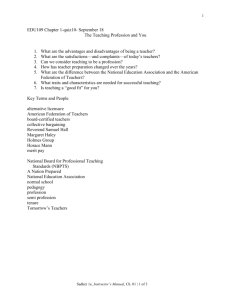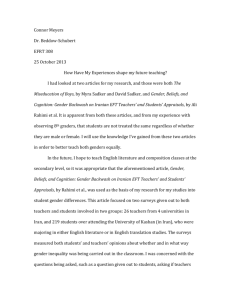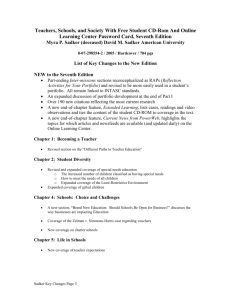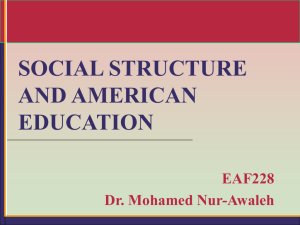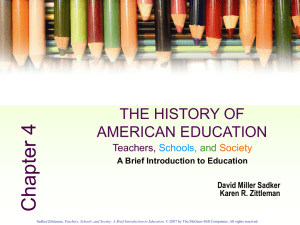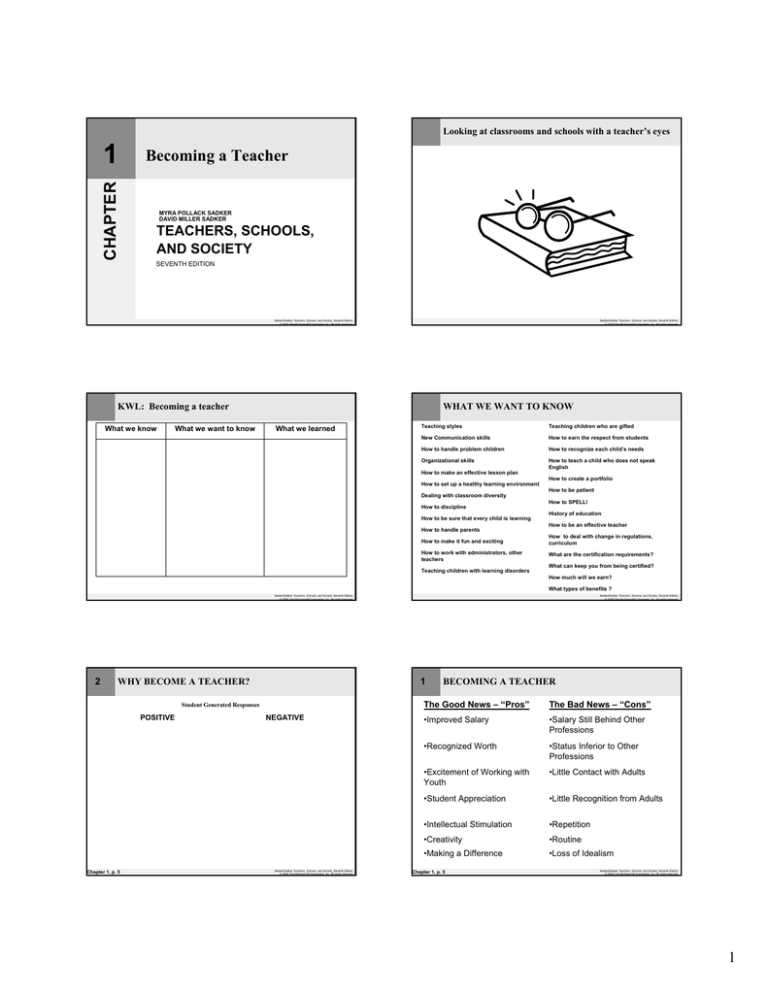
Looking at classrooms and schools with a teacher’s eyes
CHAPTER
1
Becoming a Teacher
MYRA POLLACK SADKER
DAVID MILLER SADKER
TEACHERS, SCHOOLS,
AND SOCIETY
SEVENTH EDITION
Sadker/Sadker Teachers, Schools, and Society, Seventh Edition.
© 2005 The McGraw-Hill Companies, Inc. All rights reserved.
Sadker/Sadker Teachers, Schools, and Society, Seventh Edition.
© 2005 The McGraw-Hill Companies, Inc. All rights reserved.
KWL: Becoming a teacher
What we know
What we want to know
WHAT WE WANT TO KNOW
What we learned
Teaching styles
Teaching children who are gifted
New Communication skills
How to earn the respect from students
How to handle problem children
How to recognize each child’s needs
Organizational skills
How to teach a child who does not speak
English
How to make an effective lesson plan
How to set up a healthy learning environment
Dealing with classroom diversity
How to discipline
How to be sure that every child is learning
How to handle parents
How to create a portfolio
How to be patient
How to SPELL!
History of education
How to be an effective teacher
How to make it fun and exciting
How to deal with change in regulations,
curriculum
How to work with administrators, other
teachers
What are the certification requirements?
Teaching children with learning disorders
What can keep you from being certified?
How much will we earn?
What types of benefits ?
Sadker/Sadker Teachers, Schools, and Society, Seventh Edition.
© 2005 The McGraw-Hill Companies, Inc. All rights reserved.
2
WHY BECOME A TEACHER?
1
Student Generated Responses
POSITIVE
Chapter 1, p. 5
Sadker/Sadker Teachers, Schools, and Society, Seventh Edition.
© 2005 The McGraw-Hill Companies, Inc. All rights reserved.
NEGATIVE
Sadker/Sadker Teachers, Schools, and Society, Seventh Edition.
© 2005 The McGraw-Hill Companies, Inc. All rights reserved.
BECOMING A TEACHER
The Good News – “Pros”
The Bad News – “Cons”
•Improved Salary
•Salary Still Behind Other
Professions
•Recognized Worth
•Status Inferior to Other
Professions
•Excitement of Working with
Youth
•Little Contact with Adults
•Student Appreciation
•Little Recognition from Adults
•Intellectual Stimulation
•Repetition
•Creativity
•Routine
•Making a Difference
•Loss of Idealism
Chapter 1, p. 5
Sadker/Sadker Teachers, Schools, and Society, Seventh Edition.
© 2005 The McGraw-Hill Companies, Inc. All rights reserved.
1
NACE = National Association of Colleges & Employers
SALARY SURVEY SNAPSHOT DATA (published by Career Services with permission from NACE)
What is the REAL truth about salaries for teachers?
Compare most recent surveys:
NACE grants permission to publish these charts for a specified period of time.
We do not have permission to publish older reports than those shown below.
Spring 2006
Summer 2005
Fall 2005
1. What is the difference between an average salary and
the beginning salary?
2. Where does Georgia stand relative to the Southeast?
Relative to the U.S.?
3. Where can the information on Georgia salaries be
found? http://public.doe.k12.ga.us/fbo_budget.aspx
4. How do teacher salaries compare to other professions
with similar training?
Sadker/Sadker Teachers, Schools, and Society, Seventh Edition.
© 2005 The McGraw-Hill Companies, Inc. All rights reserved.
BEGINNING and AVERAGE TEACHER SALARIES:
8
REGION
Georgia
Southeast
AVERAGE SALARY
$43,933
North Carolina
BEGINNING SALARY
$32,283
42,118
29,359
Virginia
41,752
31,238
South Carolina
39,923
27,268
Florida
39,275
30,096
Tennessee
38,515
28,857
Kentucky
37,951
26,813
Alabama
37,206
29,938
West Virginia
36,775
25,633
Louisiana
36,328
28,229
Arkansas
36,026
27,565
Mississippi
33,295
24,567
$44,367
$30,719
U.S. AVERAGE
12
HIGH AND LOW AVERAGE SALARIES OF
PUBLIC SCHOOL TEACHERS
U.S. Average $44,367
Rank State
1
California
2
Michigan
3
Connecticut
4
Rhode Island
5
New York
6
District of Columbia
46
47
48
49
50
51
Arkansas
Montana
Mississippi
Oklahoma
North Dakota
South Dakota
Sadker/Sadker Teachers, Schools, and Society, Seventh Edition.
© 2005 The McGraw-Hill Companies, Inc. All rights reserved.
13
AVERAGE TEACHER SALARIES
HIGH AND LOW vs. AVERAGE
Average Teacher Salary
2001-2002
Figure 1.1, Chapter 1, p. 9
14
5,235
51,000
31,097
10,212
32,757
41,452
8,503
9,089
36,026
34,379
33,295
32,870
32,468
31,383
Sadker/Sadker Teachers, Schools, and Society, Seventh Edition.
© 2005 The McGraw-Hill Companies, Inc. All rights reserved.
NEW TEACHER SATISFACTION AND
WILLINGNESS TO ENTER TEACHING AGAIN
$36,294
$44,367
$30,719
$31,383
$20,988
National
Average
California
Highest Paying
North Dakota
Lowest Paying
State
National
Average
Alaska
Highest Paying
Source: U.S. Department of Education, National Center for Educational Statistics
Chapter 1, p. 9
Average Salary
$54,348
52,497
52,376
51,619
51,020
Average Beginning Teacher
Salary 2001-2002
$54,348
South Dakota
Lowest Paying
State
Total Teachers
304,598
96,900
41,263
10,455
215,500
Source: American Federation of Teachers Survey and Analysis of Teacher Salary Trends (2002)
Source: American Federation of Teachers, Annual Survey of State Departments of Education (2002)
Figure 1.1, Chapter 1, p. 9
Sadker/Sadker Teachers, Schools, and Society, Seventh Edition.
© 2005 The McGraw-Hill Companies, Inc. All rights reserved.
Close window and return to current NACE data
Sadker/Sadker Teachers, Schools, and Society, Seventh Edition.
© 2005 The McGraw-Hill Companies, Inc. All rights reserved.
Source: Public Agenda Online, April 2000.
Figure 1.2, Chapter 1, p. 13
Sadker/Sadker Teachers, Schools, and Society, Seventh Edition.
© 2005 The McGraw-Hill Companies, Inc. All rights reserved.
2
l
m
e
n
t
:
Who are our teachers?
p
o
STATE rOF GEORGIA
t
1
,
5
1
Certified Personnel Data
5
,
Support Perso
6
Administrators
nnel
4
In terms of gender
In terms of race
Positions
Personnel
Gender
In terms of years of experience
Source:
http://reportcard2005.gaosa.org/k12/persfiscal.aspx?Tes
tType=pers&ID=ALL:ALL
PK-12 Teachers
9,999.83
$55,179.84
195.43
$282.35
104,450.40
$46,437.04
190.38
$243.92
R
e
a724
3,009
4,287
d
1,236
e2
2,699
6,475
r53
7,133
2,125
9,350
2,742
100,806
5,206
Male
Female
3,201
6,057
2,180
9,912
19,636
86,376
1,401
6,834
3,368
477
12
48,819
44,034
11,607
1,151
401
17
9
5
2,745
9,238
63
22
8
16
22,157
81,956
1,038
538
113
210
53
1,514
2,930
3,599
1,162
20.17
422
4,197
3,571
3,098
804
15.29
6,376
46,505
29,709
19,435
3,987
12.55 *Includes One- and Two-Year Vocational Certificates.
4 Yr Bachelor's
5 Yr Master's
6 Yr Specialist's
7 Yr Doctoral
Other *
Race/
Ethnicity
Black
White
Hispanic
Asian
Native American
Multiracial
Sadker/Sadker Teachers, Schools, and Society, Seventh Edition.
© 2005 The McGraw-Hill Companies, Inc. All rights reserved.
G
e
t
6
7,499.19
$76,267.98
218.65
$348.81
Full-time
Part-time
Certificate
Level
Years
Experienc
e
Is teaching a profession or a semi-profession?
Number
Average Annual Salary
Average Contract
Days
Average Daily Salary
<1
1-10
11-20
21-30
> 30
Average
Sadker/Sadker Teachers, Schools, and Society, Seventh Edition.
© 2005 The McGraw-Hill Companies, Inc. All rights reserved.
Teacher certification – traditional & alternative paths
Historic background on teaching profession
In Georgia, certification is provided by Professional Standards
Commission http://www.gapsc.com
Teachers in the colonies
Normal schools
Traditional =
Teachers Colleges
• Bachelors degree in teaching field, meet state
requirements.
Some Bachelors programs, some Masters programs
Alternative = Georgia TAPP
•
NBPTS certification
Bachelors degree, pass content and skills tests, job offer, and internship
courses
• Bachelors degree, test-based with job offer and practicum
Video Segment #2
* 2.5 GPA required for ALL certification types.
Sadker/Sadker Teachers, Schools, and Society, Seventh Edition.
© 2005 The McGraw-Hill Companies, Inc. All rights reserved.
15
WHAT’S WORTH TEACHING TEACHERS
Sadker/Sadker Teachers, Schools, and Society, Seventh Edition.
© 2005 The McGraw-Hill Companies, Inc. All rights reserved.
Where do you stand on these issues?
What causes student misbehavior? (poor teaching, lack of
structure, poor parenting)
ESSENTIAL TO TEACH…
• Lifelong learning and update skills
Should students who fail state tests be promoted to the
next grade?
• Kids to be active learners
• Hold high expectations
• Know content
Are teachers responsible for teaching values?
• Versed in child development
Are teachers born, or made?
• With limited resources or if kids are not ready to learn
• Trained in pragmatic issues (time and behavior
management)
Should school systems adopt the Southwest Airlines
philosophy?
• Maintain order and discipline
• Stress correct grammar, spelling, punctuation
• Expect students to be neat, on time, and polite
Source: Different Drummers: How Teachers of Teachers View Public Education, Public Agenda, 1997.
Chapter 1, p. 20
Sadker/Sadker Teachers, Schools, and Society, Seventh Edition.
© 2005 The McGraw-Hill Companies, Inc. All rights reserved.
Sadker/Sadker Teachers, Schools, and Society, Seventh Edition.
© 2005 The McGraw-Hill Companies, Inc. All rights reserved.
3
How should you prepare for a career in teaching?
Investigate the job market. http://public.doe.k12.ga.us
KWL: Becoming a teacher
What we know
What we want to
know
What we learned
Plan coursework carefully. Graduate from ABAC for
optimum transferability. Keep GPA above 2.5!
Become involved in extracurricular activities.
Form a network of mentors and fellow majors.
Collect recommendations.
Develop a resume and portfolio.
Show yourself as a positive role model; principals have
long memories!
Sadker/Sadker Teachers, Schools, and Society, Seventh Edition.
© 2005 The McGraw-Hill Companies, Inc. All rights reserved.
Sadker/Sadker Teachers, Schools, and Society, Seventh Edition.
© 2005 The McGraw-Hill Companies, Inc. All rights reserved.
4

